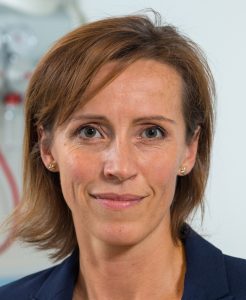As part of our ongoing seminar series, the Centre of Excellence in Severe Asthma hosted A/Prof. Celeste Porsbjerg, for a webinar on “Non-Eosinophilic Asthma: Common but Poorly Understood” on 01 February 2017.
Presentation Summary:
It is now well-recognised that asthma consists of a range of phenotypes. Different patterns of airway inflammation occur in different patients. The inflammatory phenotype effects response to therapy.
Significant progress has been made in our understanding of “eosinophilic” asthma. As a result, several targeted therapies are available for eosinophilic disease. However, non-eosinophilic asthma remains poorly understood.
Non-eosinophilic asthma is common, but disease mechanisms are poorly understood. Several factors have been proposed in non-eosinophilic asthma. These include microbiome, T cell subsets and mast cells. Ion transport in smooth muscle cells may also be altered.
People with non-eosinophilic asthma are less likely to respond to inhaled corticosteroid (ICS) treatment. A/Prof. Porsbjerg raises the question of whether long acting bronchodilators (LABAs) should be considered for add-on therapy instead for this population.
Targeted treatment approaches are required for non-eosinophilic asthma. An improved understanding of the mechanisms underlying disease in this population is required.
Key Points:
- Asthma is characterised by chronic airway inflammation
- Different patterns of airway inflammation are present in different people
- Non-eosinophilic asthma is at least as common as eosinophilic asthma
- Many patients are paucigranulocytic, with no immune granulocytes in their airways
- Most new asthma therapies are targeted at Type-2 inflammation and eosinophilic disease
- Potential factors involved in non-eosinophilic asthma include airway microbiome, T cell subsets (e.g. Th1/Th17) and mast cells
- Microbiome is altered in non-eosinophilic asthma, although differences are not predictive of neutrophilic inflammation
- Mast cell numbers are increased in non-eosinophilic asthma
- Non-eosinophilic asthma is less likely to respond to inhaled corticosteroid (ICS) treatment
- Long-acting bronchodilators (LABAs) may be a better add-on therapy for non-eosinophilic asthma, rather than ICS. However, more study is required.
- Ion transport may be an alternate mechanism of ICS action in non-eosinophilic asthma
- Ion transport reduces intracellular calcium in smooth muscles, leading to relaxation
- Ion transporter pump regulation and activation are effected by steroids and long-acting beta-2 agonists (LABAs)
- Inhaled budesonide treatment increased skeletal muscle ion content in healthy adults
About A/Prof. Celeste Porsbjerg:
Celeste Porsbjerg is a Respiratory Specialist and Clinical Research Associate Professor at the Bispebjerg Hospital and University of Copenhagen.
Her research interests revolve around the diagnosis and phenotyping of asthma, with a focus on airway pathophysiology and inflammation. During her Ph.D., she described the usefulness of bronchial provocation testing with mannitol for assessing inflammation driven airway hyperresponsiveness. During her post doc with Professor Peter Gibson’s group in Australia in 2010-11, she described the relationships between airway pathophysiology and subtypes of airway inflammation in older adults with asthma.
Her current research projects are focused on severe asthma, including systematic assessment, phenotyping and biological treatment.

